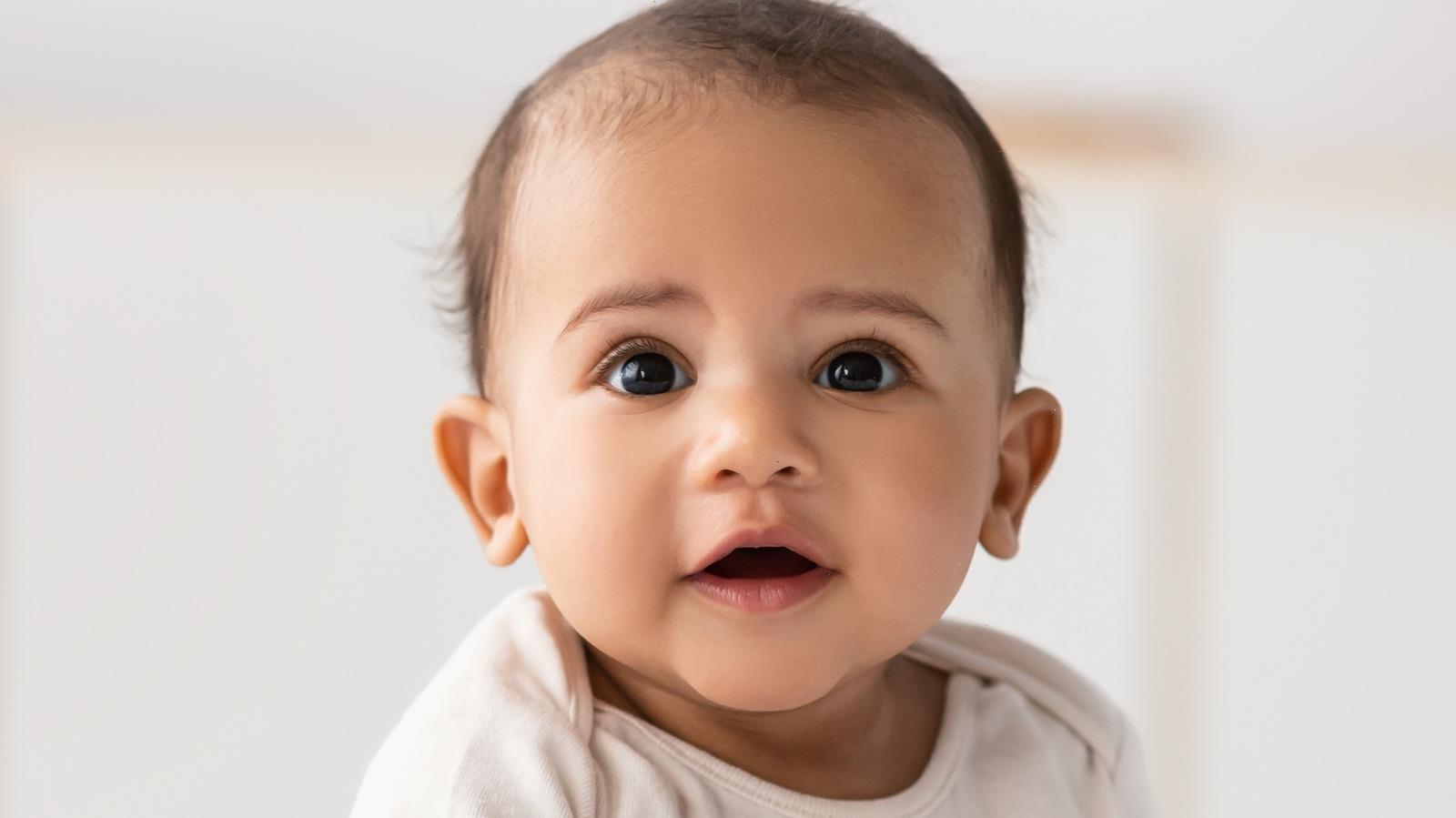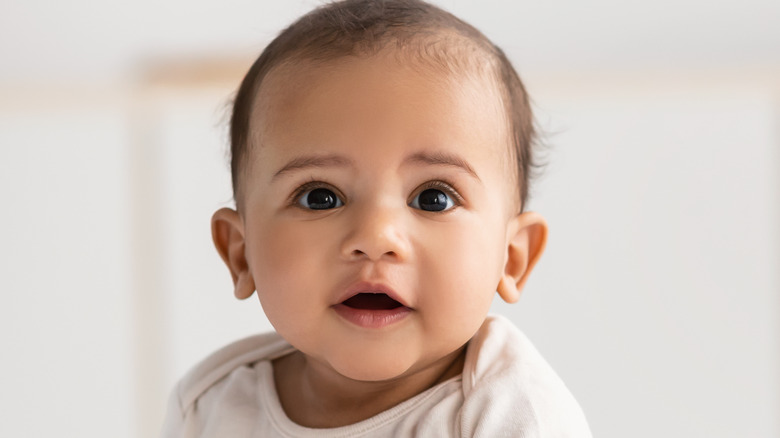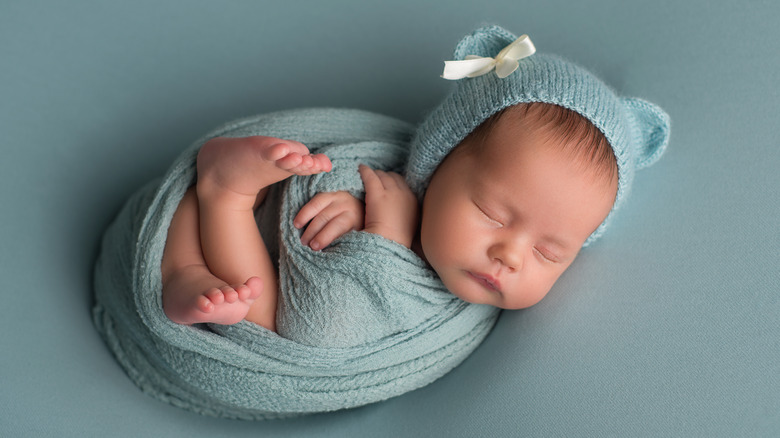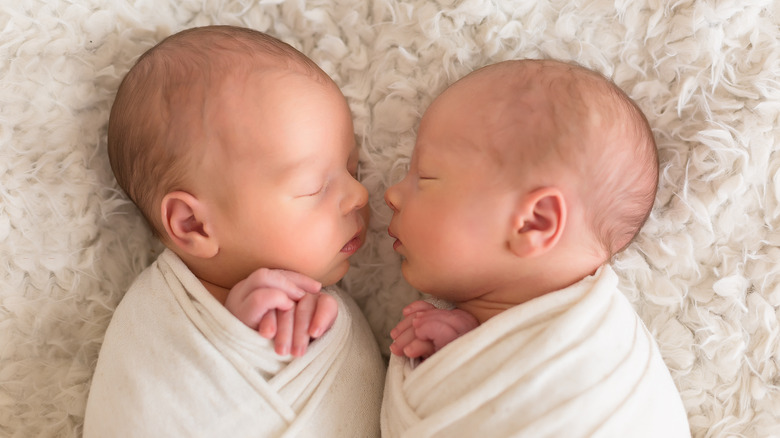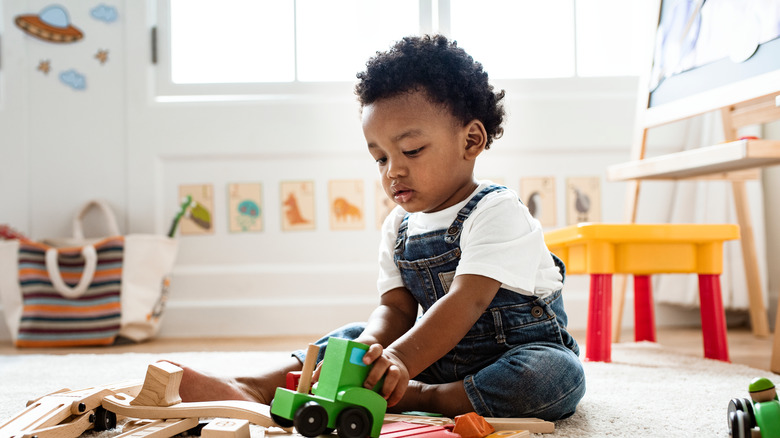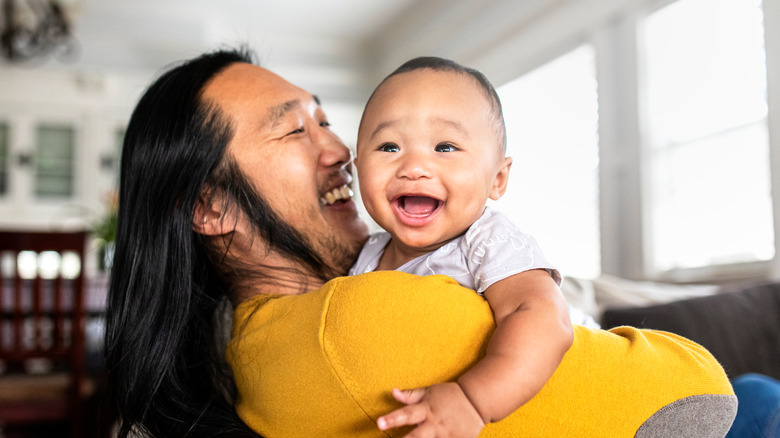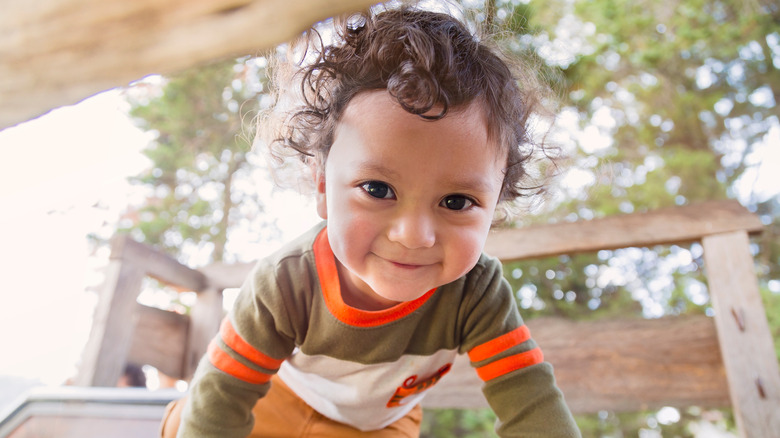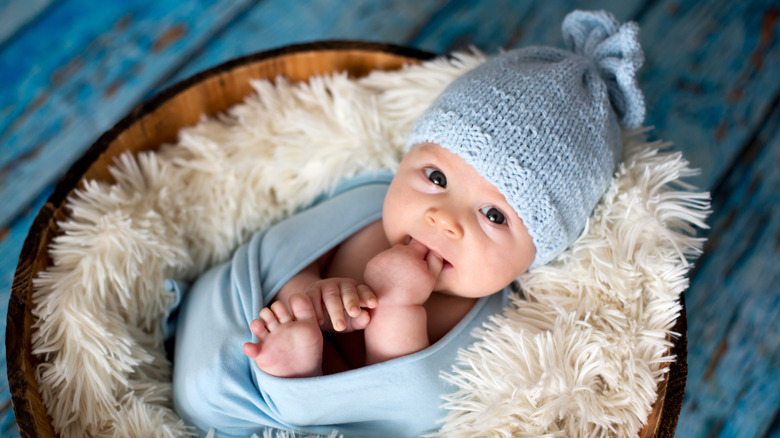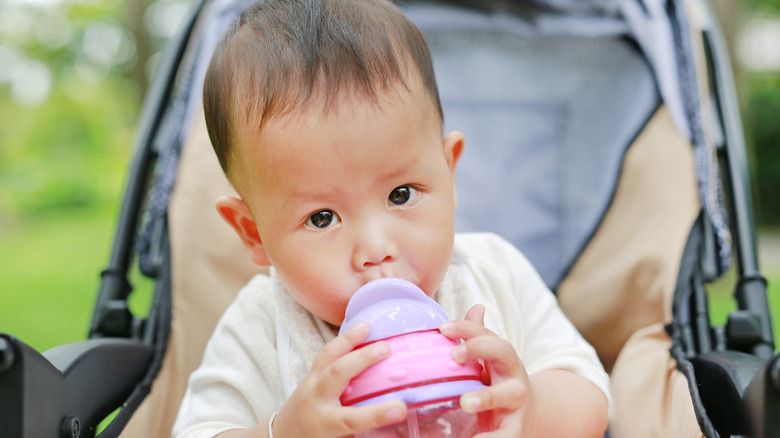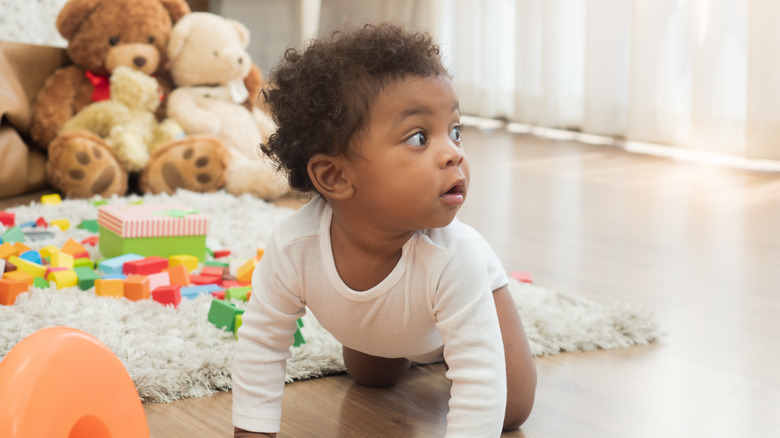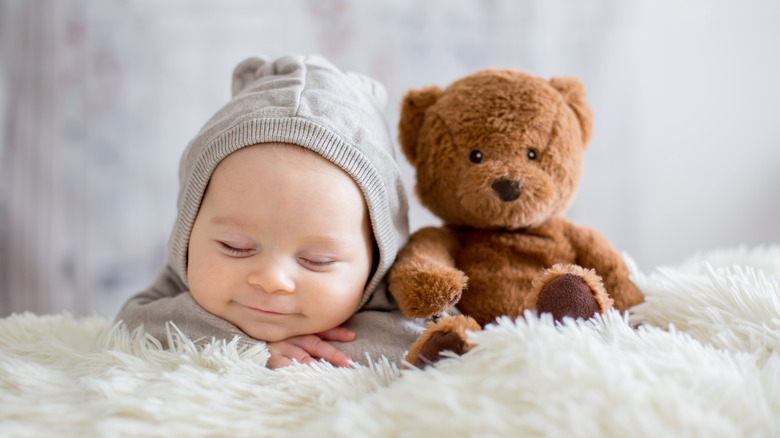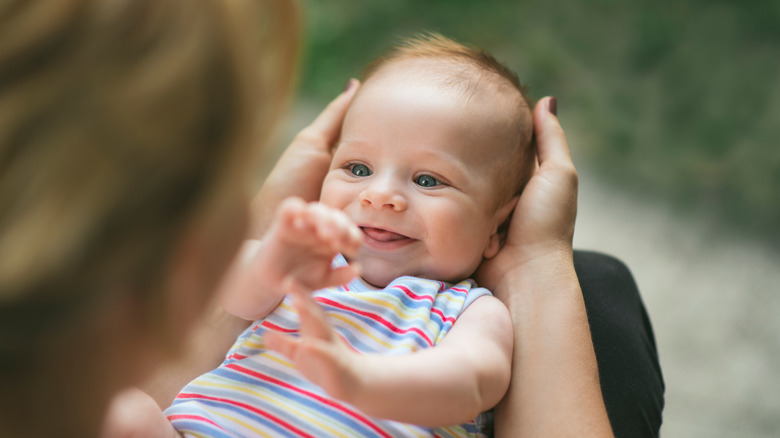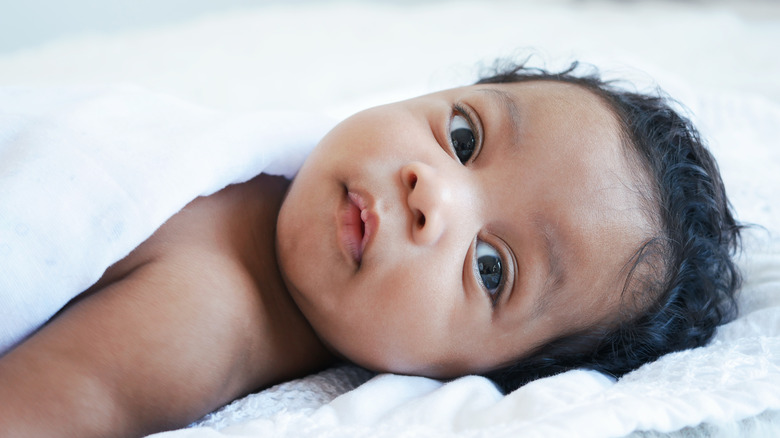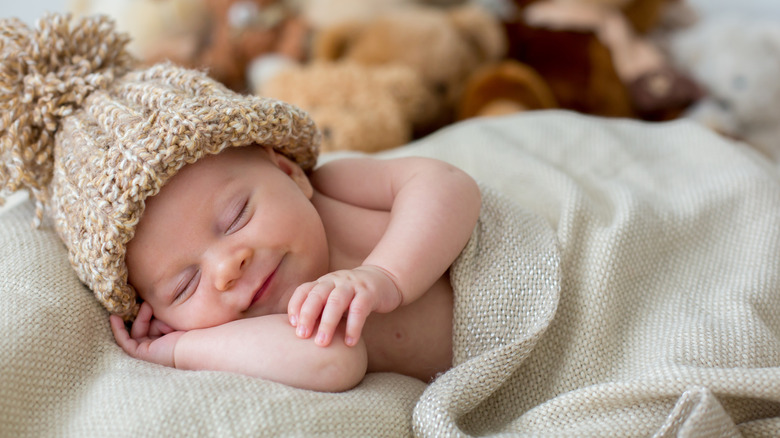Whether you’re hoping to avoid an over-popular name for your bundle of joy or you’re searching for the perfect name to honor a loved one born during a specific time period, this list of the most popular baby boy names from each decade is sure to educate and inspire you in your quest for the perfect name for your sweet babe. You’ll discover the top names from each decade beginning with the 1880s and leading up to the 2010s, plus how many people shared each name in the U.S. during the decade. And, of course, we’ll get into the meaning of the name, celebrities who share the name, and famous folks born during the time period, too!
While we can’t say for certain which names will be most popular this decade, we wouldn’t be surprised if a few of these historically popular monikers popped up again. If you’re hunting for a traditional name for your little one, This List has you covered with this list of the most popular baby boy names from each decade.
1880s: John, William, and James were everywhere
This may blow your mind, but, according to the Social Security Administration, in the 10 years comprising the 1880s, only 1,177,158 baby boys were born in the U.S. That number is 20 times less than the number of baby boys born during the 2010s. From 1880 to 1889, John was the most popular boy name, and understandably so, considering the Hebrew name means “God is gracious,” as noted by SheKnows. Clearly, the name has remained popular throughout the ages, as, most notably, the 35th president of the United States, John F. Kennedy boasted the moniker.
During this decade, 89,950 male babies shared the name John, which is only slightly more than the 84,881 boys who shared the name William during the time period. The name we now know as William originated as the Old German Wilhelm, meaning “resolute protector,” according to Verywell Family.
Rounding out the top three names of the 1880s, the Hebrew name James, meaning “supplanter,” was given to 54,056 babies during the decade.
1890s: John, George, and Charles were popular choices
Throughout the 1890s, the top three names for baby boys remained the same as the previous decade: 80,665 Johns, 72,244 Williams, and 50,723 Jameses were born this decade, according to the Social Security Administration. Next in line came George; there were 43,358 baby boys were named George during these 10 years. The name has Greek origins and means “farmer” — from the parts “ge” meaning “earth” and “ergon” meaning “work,” according to BabyCentre.
Also in the 1890s, there were 36,848 boys named Charles. As an English and French version of the name Carl, Charles has continued to be a prominent name throughout the countries of Europe and means “free man,” according to CharliesNames. Considering the name Charles is an English variation, it’s no surprise both world-renowned author Charles Dickens and equally popular comic and actor Charlie Chaplin both hail from the UK and, interestingly, Chaplin was born in 1889, just one year before his name piqued in popularity.
Slightly less common than the former two popular baby boy names of the 1890s, Joseph was still within the top ten names of the decade with 29,000 boys having the strong moniker.
1900s: John still reigned supreme
Entering a new century, the 1900s brought along with it modernized monikers with European origins. Once again, John, a strong boy name you’ll want for your baby, remained the utmost popular name of the decade, with 84,591 boys sharing the name. The names William, James, George, and Charles again followed behind.
According to the Social Security Administration, the English name Robert, meaning “bright fame” (via Family Education), came in sixth and belonged to 35,849 boys. After Joseph, the name Frank — which comes from German origins and means “Frenchman or free man,” according to Nameberry – and Edward — which comes from English origins and means “wealthy guardian” — belonged to just over 24,000 babies each between 1900 and 1909. Both prominent names make for ideal monikers then and now, as they have such strong meanings.
So who from this time period shared these names? American poet and Pulitzer Prize winner Robert Frost brought honor to the name throughout his writing career and provided poetry lovers with brilliant works like “The Road Not Taken” and “The Gift Outright.” Similarly, the 1890s name Frank has continued its fame through artists like jazz musician Frank Sinatra and puppeteer behind the Muppets, Frank Oz. Born just one year before the decade began, Edward Ellington, more commonly known as Duke Ellington, was an American pianist who later became one of the best jazz composers of the era, according to Britannica.
1910s: After John, Thomas, Walter, and Harold were popular baby names
Beginning the decade with WWI and finishing it out with The Treaty of Versailles, the 1910s were highly historically relevant years that brought us some of the most popular names for baby boys during the time period: Thomas, Walter, and Harold. While these three names were among the top 15 names of the decade, the SSA shows that, once again, John reigned supreme with 376,316 boys sharing the name.
Belonging to 91,619 baby boys from 1910 to 1919, Thomas, in 10th place on the list of the most popular names of the time, comes from Hebrew origins and means “twin,” according to Verywell Family.
After Thomas, 89,146 baby boys shared the name Walter, and there were 79,721 male babies with the name Harold. Both names are of English descent, and — believe it or not — both names also mean “ruler of the army” or “leader,” according to Behind the Name. Numerous famed individuals throughout the ages share the most popular boy names of the 1910s, including the third president of the United States, Thomas Jefferson; inventor Thomas Edison; broadcast journalist Walter Cronkite; and actor-comedian Harold Lloyd.
1920s: Robert took the top spot
The “Roaring Twenties” brought along joy, prosperity, jazz bands, and flappers, along with a slew of newly popular boy names for the little men of the decade. Of all the male babies born between 1920 and 1929, the most (576,376) were named Robert, while 222,605 shared the name Richard (No. 8 on the list of popular names), 191,823 were named Donald (No. 10), and 132,391 shared the moniker Paul (no. 14), according to the SSA. As unique as the baby boys themselves are the meanings of each of these three common names from the 1920s. With English origins, Richard means “powerful leader” (via The Bump), while Paul means “small” and “humble,” as Behind the Name notes. Equally original, Donald stands for “great chief,” according to The Bump.
These names have continued their popularity over the decades. Richard Nixon, the 37th president of the United States, was born just seven years before the 1920s began and was responsible for ending American involvement in the Vietnam War (via the White House website). Richard Lionheart was not only a great king of England, but he was also a brave soldier and great crusader, as explained by Historic UK. Similarly, history-making Paul Revere may have influenced the popularity of the name Paul during the 1920s.
1930s: Robert, James, and John were the most popular baby boy names
Sure, you’re familiar with historic events from the 1930s like the Great Depression, the Dust Bowl, and the Hindenburg explosion, but do you know the most popular names for baby boys during the decade? Lucky for you, we’ve got the list right here! As was the case in the 1920s, Robert was, yet again, the most popular name of the decade with 590,774 boys sharing the name, followed by James and John, according to the SSA.
Skipping past popular baby boy names we’ve already shared, 164,692 baby boys across the globe were named David during the 1930s. The traditional Hebrew name means “beloved,” according to Verywell Family. The popular Scottish name Kenneth belonged to 125,095 babes throughout the decade and means “born of fire, handsome,” as Nameberry explained, whereas the German name Raymond, meaning “wise-protector,” was given to 99,582 boys during the era.
So, just what famous people with this name were born around this time? Born just four years before the beginning of the decade, Sir David Attenborough was a journalist, broadcaster, and natural historian who was most widely known for his multi-part series “Life,” according to Britannica. Throughout his acting career, David Carradine, born in 1936, starred in martial arts roles, portraying his wide range of skills.
1940s: Most baby boys were named James this decade
Across the U.S. during the ten years of the ’40s, 795,738 baby boys were named James, making it the most popular name of the decade. Moving past the popular names of previous decades we’ve already shared, 336,553 were named Michael (No. 9), and 282,448 were named Ronald (No. 10), according to the Social Security Administration. Popular names from the 1940s include Hebrew name James, meaning “supplanter” (via BabyNames.com); Hebrew-originating Michael, meaning “Who is like God?” (via Verywell Family); and English name Ronald, meaning “counsel rule.”
Born just nine years before the turn of the 1940s, suave American actor James Dean remains legendary in pop culture today, so if you’re a fan of the actor or his work, James might just be the name for your baby boy! Similarly, actor Michael Caine (real name Maurice Joseph Micklewhite) was born shortly before his stage name entered peak popularity, and since then, his work in film has lasted over 70 years. Talk about a prosperous career!
1950s: James, Mark, and Stephen were top picks
In addition to the rise of the Civil Rights movement and TVs becoming a commonplace home appliance (via History), the 1950s were also responsible for making three names more popular: Mark, Stephen, and Gary. James once again took first place in the popularity contest with 843,658 boys being given the name, according to the SSA. But in ninth place, 382,503 boys shared the name Mark, while 333,601 were named Stephen (No. 11) and 329,881 shared the name Gary (No. 12) during the ’50s.
The Greek name Stephen, meaning “crown” (via Behind the Name), belonged to theoretical physicist Stephen Hawking, who was born just eight years before the 1950s arrived, and to famed “E.T.” and “Schindler’s List” producer Steven Spielberg, who was born in 1946. Coincidentally, the popular 1940s name Gary means “spear,” according to Behind the Name, and Gary Busey appeared in “Lethal Weapon” — a spear is a lethal weapon after all!
Meaning “God of war” and coming from Latin roots, as Verywell Family noted, Mark has remained such a popular name over the past 70 years. One of the first of the gospels in the New Testament of the Bible, Mark also belongs to “Star Wars” actor Mark Hamill, who was born in 1951, although you likely know him as Luke Skywalker. It’s quite likely the famed and beloved author Mark Twain was partially responsible for the increased popularity of the name during the 1950s, as his works have remained prevalent for over a century (via Mark Twain House).
1960s: Michael was the No. 1 baby boy name
Halfway into the 20th century, the 1960s brought along with it monumental, history-making events like the Cuban Missile Crisis and, on a more positive note, the first man landing on the moon, as noted by PBS. Despite Michael being the top name of the decade with 833,201 boys sharing the name, the following names were also given to lots of boys throughout the ’60s, according to the SSA: Jeffrey, Timothy, and Kevin.
English name Jeffrey belonged to 302,027 baby boys in the 1960s, making it No. 10 on the list, and — when spelled “Jeffery” — means “peace,” according to The Bump. The sentiment alone is reason enough to name your little one Jeff! Notably American film director J.J. Abrams, whose first name is Jeffrey, was born in 1966 and brought us movies like “Mission: Impossible III” and the more recent films within the “Star Wars” series (via IMDb).
The names Timothy and Kevin (No. 13 and 14, respectively) follow Jeffrey in terms of most popular baby boy names of the ’60s, with 276,840 boys sharing the Greek name Timothy, meaning “God’s honor” (via The Bump), and 271,437 sharing the Gaelic name Kevin, meaning “handsome, beautiful” (via BabyNames.com).
1970s: Michael, Christopher, and Jason were popular baby boy names
As time continues, more and more baby boys were born each progressing year, bringing along new names in increasing popularity. Over the span of the ten years comprising the 1970s, 707,619 boys were named Michael, while 475,613 little misters shared the name Christopher and nearly just as many, 462,934, shared the name Jason, according to the Social Security Administration. Rounding out the top names for boys during the ’70s, 322,825 boys were given the name Brian, making it No. 8 on the most popular names of the decade list.
Meaning “bearer of Christ,” Christopher is derived from Greek origins (via Verywell Family), while the name Jason means “healer.” The name Brian comes from Irish roots and means “high” or “noble,” according to The Bump.
Most easily remembered by the sing-songy rhyme taught throughout the elementary school years, “In 1492, Columbus sailed the ocean blue,” Christopher Columbus will forever go down in history as the man who came across America (via History) and may have influenced the name’s popularity during the ’70s. In the entertainment industry, celebs sharing the common 1970s name include “That ’70s Show” star Topher Grace, born in 1978, and Coldplay lead singer Chris Martin, born in 1977. Similarly, multiple actors and stars share the ’70s names Jason and Brian, as seen with actor Jason Momoa, born in 1979, and comedian Brian Quinn, born in 1976, according to IMDb. If you’re a fan of any (or all!) of these superstars, their names may be the perfect for your little boy!
1980s: Michael, Joshua, and Daniel were common choices for boys
Unforgettable events of the 1980s include Sally Ride’s achievement of becoming the first woman in space, the birth of the Macintosh computer, and the inauguration of both presidents Ronald Reagan and George H. W. Bush (via SEC Historical). And of course, with a new decade comes a new wave of charming monikers given to baby boys born during the ’80s. While Michael was the most popular name of the time with 663,830 babies being named that, Joshua, Daniel, and Justin were popular too, according to the Social Security Administration.
According to Verywell Family, the Hebrew name meaning “God is deliverance” belonged to 396,616 baby boys between 1980 and 1989, including stars Josh Peck and Josh Groban. Originally seen throughout the Old Testament, Joshua was the immediate successor to prophet Moses, as noted by Britannica. Also coming from biblical origins, Daniel was given to 345,559 newborn boys in the ’80s and was seen in the well-known story of “Daniel in the Lions’ Den.” Joining the previous names in the rankings of top names for boys in the 1980s, Justin descends from Latin roots, means “just” and “righteous” (via The Bump), and belonged to 289,830 babies born within the decade.
1990s: The baby boy name Michael stayed on top
Leading up to Y2K, the 1990s have since been known for their far-out fashion trends like bandanas and ripped jeans, the introduction of “grunge” to the music scene, and the irreplaceable search engine Google. Of the most popular names for baby boys in the 1990s, the names Michael, Nicholas, Andrew, and Tyler appeared often, according to SSA. The No. 1 name for four consecutive decades, Michael belonged to 462,360 babes in the ’90s. In sixth, after names like Christopher, Matthew, and Joshua, Nicholas, an English name meaning “people of victory,” belonged to 275,308 babies, including singer Nick Jonas. The Greek name Andrew, meaning “strong and manly,” was given to 272,884 babies, according to Verywell Family. Simply meaning “maker of tiles,” the English name Tyler belonged to 262,292 boys of the ’90s (via Family Education).
It’s safe to say the 1990s were a memorable period of time, and the decade brought along with it names for baby boys people still use often today.
2000s: Jacob was the No. 1 baby boy name
The year 2000 not only marked the turn of a new century, but also the turn of a new millennium. How lucky are we to have lived through such a rare event! During the monumental change of times, popular names of the decade given to newborn baby boys around the U.S. included Jacob, Ethan, and Anthony. While the population continued to increase, the popularity of names seemed to decrease. So while only 273,911 boys were named Jacob, that’s just because more and more boys were given a wide range of unique names, as opposed to being given traditionally popular names, according to the Social Security Administration. Skipping names we’ve already shined a light on, 201,795 babies were named Ethan (No. 8) and 191,874 were named Anthony (No. 11).
Hebrew name Jacob means “supplanter,” while Hebrew name Ethan means “safe,” “solid,” “strong,” and “firm,” according to Verywell Family. The Latin-originating name Anthony, one of the best baby boy names starting with “A,” means “priceless one” (via Family Education). In the pop culture realm, Anthony belongs to plenty of stars like Tony Hawk, Tony Danza, and Tony Romo, all of whom may have influenced parents’ decisions in naming their kids during this decade.
2010s: More baby boys were named Noah than any other name this decade
As the most recent decade to come to a close, the 2010s were full of history-making events like the Occupy Wall Street protests, the Black Lives Matter movement, Donald Trump’s presidential election, Brexit, and more. During this time, the most popular baby boy names included the trendy, ultra-modern names Noah, Liam, and Mason. Although having only been on the modern name scene for the last few decades, Noah, the name given to 182,993 newborn baby boys (via SSA), comes from Hebrew origins with the comforting meaning of “rest” and “repose,” according to Verywell Family. The first written mention of Noah is found in the Old Testament of the Bible in the unforgettable story in which he boarded two of every animal on his ark.
Slightly less popular during the decade were the names Liam in second place with 173,717 births, and Mason in fifth with 157,652 births — the first being Irish and meaning “strong-willed warrior” and the second being English and simply meaning “stone-worker,” as explained by Verywell Family.
Source: Read Full Article
